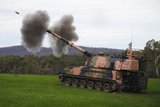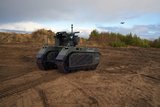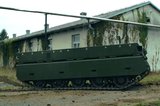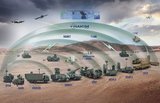Lockheed Martin receives GMLRS Unitary rocket order
Lockheed Martin has received a $255 million contract from the US Army to produce Guided Multiple Launch Rocket System (GMLRS) Unitary rockets for the US Army and Marine Corps. Rockets supplied under this order will also be delivered to Italy.
GMLRS is an all-weather rocket designed for fast deployment to deliver precision strike beyond the reach of most conventional weapons. GMLRS Unitary rockets greatly exceed the required combat reliability rate.
In combat operations, each GMLRS rocket is packaged in an MLRS launch pod and is fired from the Lockheed Martin HIMARS or M270 family of launchers.
Ken Musculus, vice president, tactical missiles, Lockheed Martin Missiles and Fire Control, said: ‘We are proud of the continued confidence our customers place in Lockheed Martin. Guided MLRS is a weapon that is trusted and proven in combat, and we will continue to deliver a reliable product.’
Delivery of this new allotment of rockets will begin in April 2015.
More from Land Warfare
-
![World Defense Show 2026: Hanwha increases Middle East presence and reveals Tigon 8x8 sale]()
World Defense Show 2026: Hanwha increases Middle East presence and reveals Tigon 8x8 sale
Shephard sat down with Hanwha Middle East and Africa president Sung Il at World Defense Show 2026 to hear about the company’s plans for the region and how it plans to use local industry success to win deals.
-
![Estonia builds Asia-Pacific links as it looks to scale defence industry capabilities]()
Estonia builds Asia-Pacific links as it looks to scale defence industry capabilities
Collaboration between Estonian defence companies and well-aligned firms in Asia-Pacific will form a key part of Tallinn’s ambitions to significantly grow its defence industrial base.
-
![World Defense Show 2026: DOK-ING working on MV-8 variants and reveals specs ahead of Eurosatory]()
World Defense Show 2026: DOK-ING working on MV-8 variants and reveals specs ahead of Eurosatory
The Croatian company began the development of the MV-8 modular uncrewed platform in the early 2020s. Specifications for the vehicle were revealed to Shephard at World Defense Show 2026.
-
![World Defense Show 2026: Turkish and European industries will cooperate, says Aselsan boss]()
World Defense Show 2026: Turkish and European industries will cooperate, says Aselsan boss
Aselsan was formed 50 years ago in response to difficulties Turkey was facing in sourcing major systems internationally. While some challenges still remain, company president Ahmet Akyol believes a rapprochement is possible.
-
![World Defense Show 2026: MARSS displays new Nation Shield air defence C2 system]()
World Defense Show 2026: MARSS displays new Nation Shield air defence C2 system
Nation Shield is the latest iteration of the MARSS C2 system and is designed to provide C2 further forward along with more capable air defence.





















